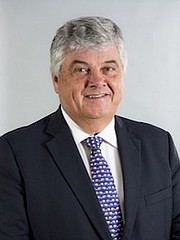By NEIL HARTNELL
Tribune Business Editor
nhartnell@tribunemedia.net
RoyalFidelity's president yesterday praised the Central Bank for "trying to get ahead" of foreign reserves stress via measures that will curtail $20m in outflows facilitated by the merchant bank last year.
Michael Anderson told Tribune Business that the restrictions on foreign exchange outflows imposed to-date by the regulator were normally seen "later in the cycle", but he acknowledged that both Central Bank, private sector and investors had never before confronted anything like the COVID-19 pandemic.
"We've only been in this situation coming up eight weeks," he said. "Some of these issues we see coming later in the cycle, but I think the Central Bank is trying to get ahead of anything out there, which is wise for everybody's sake.
"We know the need to protect our US dollar reserves, and that will be the priority requirement going forward; to make sure we have enough reserves for the country's needs. I think they're [the measures] early compared to where we'd expect to see them, but this is the type of issue that nobody's seen for a while, so it may be warranted."
John Rolle, the Central Bank's governor, on Monday signalled that maintaining the foreign currency reserves at adequate levels to support The Bahamas' balance of payment needs and the fixed exchange rate regime is among his top priorities.
Underscoring how real the threat is, he unveiled a four-strong package of measures designed to create a $300m "buffer" for the external reserves by restricting foreign currency outflows as well as seeking to generate badly-needed inflows.
The Central Bank has suspended all approvals for Bahamians seeking to invest in foreign securities and real estate, and requested that the National Insurance Board (NIB) liquidate "some" of its overseas investments and return the proceeds back home, as part of a package intended to protect the country's monetary foundation from the COVID-19 fall-out.
These two initiatives join the bar on Canadian-owned bank dividend remittances. Mr Anderson, who said the dividend halt will likely produce the biggest savings, and RoyalFidelity will be most impacted - in company with other broker/dealers by the restrictions imposed on foreign asset investments by Bahamians and residents.
These block investors seeking access to global opportunities via both the Central Bank's Investment Currency Market (ICM) and the Bahamian Depository Receipt (BDR) initiative. The former, aided by the delegation of authority to the commercial banks, had allowed Bahamians and residents to buy and sell foreign currency at a five percent and 2.5 percent premium, respectively, above the official rate.
The BDR initiative, meanwhile, allowed Bahamians and residents to make local currency investments in investment funds whose broker/dealer sponsors then converted into foreign currency for the purpose of acquiring international securities. This programme, on annual basis was able to consume five percent of the external reserves up to a maximum of $35m.
"I think the local investor market has been getting more interested to get into international markets for various reasons, and it's more noticeable than a year ago," Mr Anderson told Tribune Business. "That's maybe why they [the Central Bank] saw fit to to close it down because they've seen a higher degree of money leaving that way."
The RoyalFidelity chief said the decline in the US stock markets appeared to have sparked Bahamian investor interest in getting in at attractive entry price points - a trend that emerged during the 2020 first quarter.
Prior to this, he said the six broker/dealers had not been fully using their quarterly BDR allocations of around $1.33m as there was simply insufficient demand from Bahamian investors to buy into the US and other global markets to justify doing so.
As for the Investment Currency Market (ICM), Mr Anderson added: "Over the last year we've seen a number of investors come through the ICM market because of the lower premium, so I think the restrictions will limit those people.
"Our allocation was about $5m on the BDR line, and $15m on the ICM, so somewhere between $15m-$20m came through us over last year. I don't know of the $35m BDR total how much of that was taken, but I assume $15m-$29m went through that facility."
While the suspension of economic activity for the past six weeks due to the national lockdown has kept the country's foreign reserves at near-$2bn for the moment, Mr Rolle said the Central Bank is projecting a reduction "potentially exceeding $1bn" to leave them somewhere between $800m and $1bn at year-end.
Although this level will still offer "adequate support in place to uphold the value of the Bahamian dollar fixed exchange rate", Mr Rolle said he was prepared to act swiftly in imposing even harsher restrictions if the need arises by targeting "domestic import capacity".





Comments
Use the comment form below to begin a discussion about this content.
Sign in to comment
OpenID